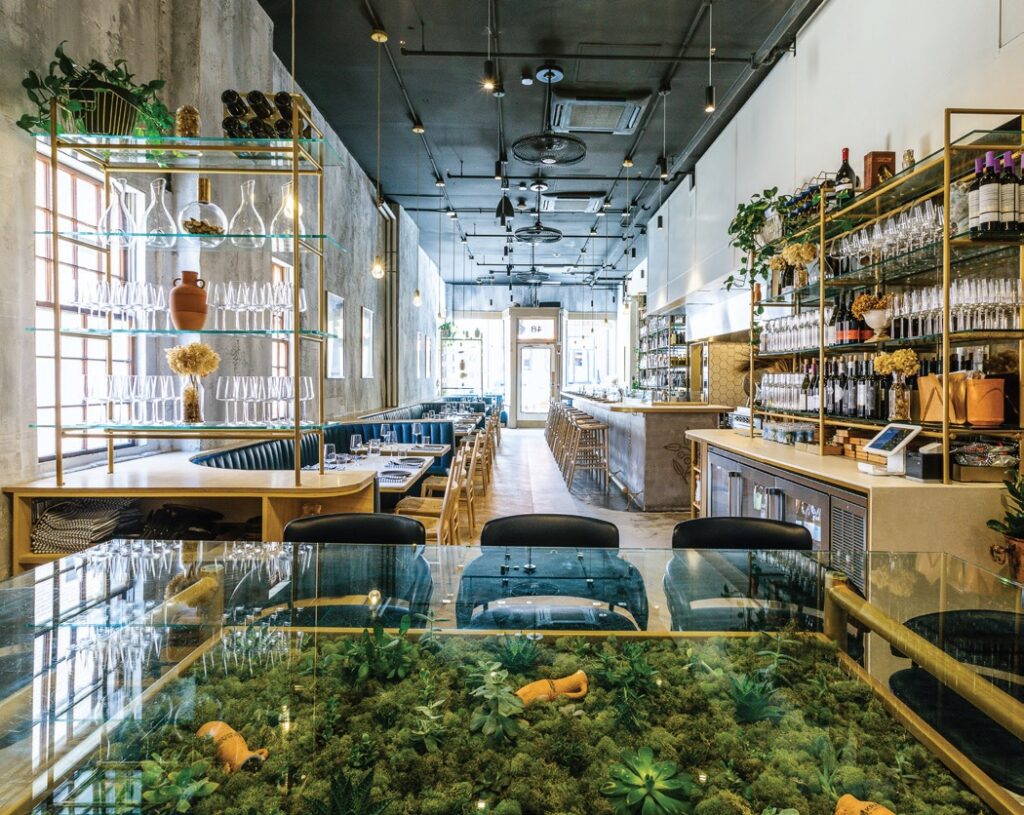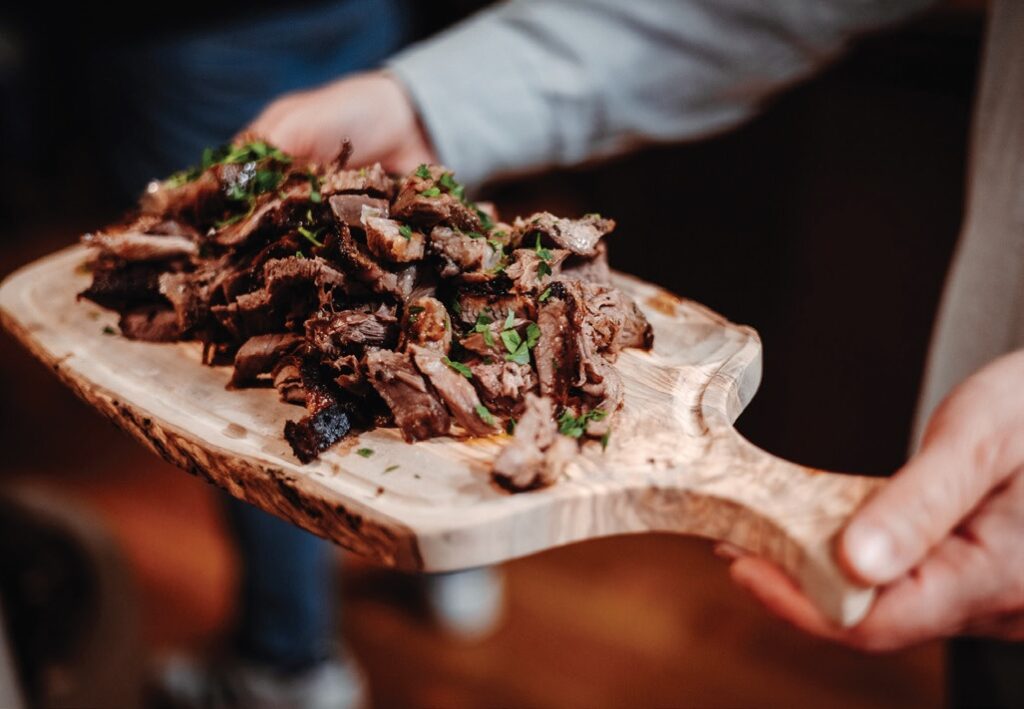Greek to the Bone
Posted by estiator at 11 November, at 15 : 11 PM Print
COVER STORY By Constantine N. Kolitsas

Xenia Greek Hospitality
Group finds its truth.

Something very interesting is happening in Boston.
Full disclosure (and it’s no secret to regular Estiator readers):I own and manage an upscale Greek concept with locations in Connecticut and New York, so it’s not easy to get me excited about another Greek concept. (Don’t get me wrong, it happens, just not so easily.) To put it in context, I’ve won multiple awards, including being named Best Restaurant in Connecticut two years consecutively, so when I get excited about something, it’s the real deal. Andin this case, I’m not excited just with a single Greek concept but with four, all of which are owned and operated by one dynamic and inspiring restaurant group.
The Xenia Greek Hospitality group is the brainchild of restaurateur Demetri Tsolakis, who first exploded onto Beantown’s scene with the uber-successful Committee Ouzeri + Bar in the city’s Seaport section. Having moved on from there, he has since opened four concepts, all focused on different aspects of the Greek culinary experience. But he hasn’t done it alone. Along with him is a talented cadre of seasoned restaurant pros; all of whom bring their unique talents and passions into making Xenia the trendsetter to watch on America’s Greek restaurant scene. Credit, says Tsolakis, goes to them, as well as to the contribution of every member of the team—a team that numbers more than 100, from servers to cook sand every position in between.

But Xenia’s concepts are not your father’s Greek restaurant concepts.
When it comes to how Tsolakis and his team represent Greek cui-sine, their aesthetic is informed by his frequent travels to Greece (travels that are very frequently shared with other members of his team), where he draws inspiration and connects profoundly to his roots. If today’s Greece draws heavily from its 2,500 years of civilization (count its culinary traditions and culture of hospitality along with architecture, philosophy, math and science, please and thank you), it is not defined exclusively by its history. Here, Tsolakis excels. His interpretation of all things Greek is a reflection of the country’s contemporary zeitgeist, projecting a hip and exciting vibe that millions of American tourists can identify with after returning from their visits to Greece.
“We are working to make Boston the hot-test Greek food hub outside of Greece, ”he boasts, and that boast is not empty. Greco, Krasi, Bar Vlaha, and Hecate are all cutting-edge establishments that could just as well be located in Athens or Thessaloniki.
“For us it’s all about spreading contemporary Greek culture through both food and hospitality,” says Tsolakis, stressing that hospitality is as important as the food.
FOUR CONCEPTS, FOUR EXPERIENCES
The oldest of Xenia’s four concepts is fast-casual entry Greco. To convey a true Greek street food experience, Tsolakis and his team didn’t look to the Greek fast-casuals that have been proliferating throughout the U.S. in the past ten years (and longer) but, rather, to what is happening in the world of contemporary Greek street food in Athens and Thessaloniki.
The goal, says Tsolakis, is to be a dominant player in the U.S. fast-casual market by staying true to authentic Greek street food culture. For this reason, you won’t find falafel or hummus in any of the eatery’s four locations (with two more poised to open soon). At the same time, the concept doesn’t shy away from innovation, evolving along with culinary trends that see a vegan gyro from pea protein keftedhes pop up on the menu, as well as of-the-pita star is halloumi cheese from Cyprus.

As you might expect, the meat gyro offerings are all hand-stacked and made in house from scratch, as are the concept’s tzatziki and tyrokafteri, among others.
The result is a flavor profile that is more authentic to what you find in Greece, says Tsolakis: “We go to Greece frequently and eat everything to make sure that we stay true.”
Krasi, the Xenia group’s highly acclaimed wine bar and restaurant, opened its doors just as pandemic was hitting, in February2020. Once the public started returning to the dining rooms, this cozy 52-seat restaurant quickly found itself packed to the gills, garnering praise from food critics while establishing itself as one of Boston’s favorite restaurants and becoming a James Beard finalist.
From a culinary perspective, Krasi focuses on regional Greek cuisine, highlighting exceptional dishes that are generally not known beyond their locales. The menu here changes five or six times a year, with little or no repetition, a testament to the rich culinary traditions found throughout Greece.
On the beverage side, it’s all about wine, as the restaurant’s name suggests. At 350 all Greek labels, Krasi has the largest wines election outside of Greece. And don’t ask for a California cabernet or a French Champagne; there’s not a single bottle here that didn’t travel from the Old Country.
At Krasi, Greek wine is a passion that spreads from Tsolakis and Xenia’s Wine Director, Evan Turner, to the server staff, and to the guests. Turner is a natural educator who makes learning fun. He conducts wine symposiums every Wednesday, and has wine flights on the menu that allow guests to explore the intoxicating allure of Greek viticulture. A wine club run by the restaurant helps guests to purchase those wines that they discover and fall in love with.
Hecate is a lesser-known Greek goddess associated with night, magic, the moon, and sorcery. Her lair is a subterranean cave in Boston that functions as a speak-easy operated by Xenia that has been named one of the world’s top 500 bars.
Under the direction of Beverage Director Lou Charbonneau, the cocktail list features ingredients that (surprise!) largely showcase Greek spirits. Make no mistake, this is a serious cocktail bar. As the menu states, vodka sodas are available from 9AM to 4PM. And the bar opens at 5PM.
Instead, cocktail connoisseurs will find elixirs whose ingredients include corn or geat, coco-nut sorbet, and saffron rhubarb. Spirits making their way into the mix include Kastro Elion Vodka, Paleokorizio orange wine, and tsipouro.
The latest boutique Greek eatery opened by the Xenia team (in March of this year) is Bar Vlaha, a culinary ode to the cuisine of the Vlahs, chosen as one of Boston Magazine’s Top 50 restaurants in Boston along with Krasi. Tsolakis says that in creating Bar Vlaha, he and his team drew inspiration from the cuisine of the nomadic Vlahs after the team took a group trip to the mountains of Central Greece. With a focus on charcoal cooking and handmade pitas, Bar Vlaha wholly embraces the essence of that community’s culinary tradition. For example, the restaurant offers only freshwater fish from streams and lakes because the distance from the mountains where the Vlahs live to the sea made saltwater fish traditionally inaccessible.

And the fidelity to the concept doesn’t stop there, with cooking methods and practices mirroring the time-honored traditions of this pastoral community. Butter, then, is churned in house, and rustic breads are made from scratch. Braised meats are cooked in gastras—clay pots that are simmered on a charcoal flame. When this team explores a concept, they leave no stone unturned, and present an experience that is true to the calling.
Around the bend, the Xenia team are preparing to open a fourth boutique concept, this time focusing on modern interpretations of Greek cuisine. Slated to open in the first half of 2024 in Boston’s South End, the new concept is highly anticipated by Boston’s foodie community and restaurant lovers.
With the focus on the islands, the team at Xenia is looking to capture the party vibe at the upscale restaurants of Santorini while exploring the ocean side of Greek cuisine. Still, Tsolakis says that the food will not be pretentious but, rather, a good, true representation.
MEET THE TEAM
Demetri Tsolakis
Like many Estiator readers, Xenia’s CEO, Demetri Tsolakis, grew up in a restaurant owned by his Greek immigrant parents. Working in the business from the time he could “reach the soda fountain,” he spent the first years of his post-college life in as an investment banker in Boston’s finance industry before taking a deep dive back into the hospitality industry, focusing entirely on the segment of the industry that piques his passion and his curiosity the most: Greek cuisine.
“As a child, I basically lived in Booth One of the restaurant,” he says.“It is there I did my homework, ate, took naps until it was time to go home and get ready for the next day.”
In addition to leading Xenia Greek Hospitality, Tsolakis recently began teaching a hospitality course at Boston University.
Stefanos Ougrinis
Serving as the group’s Chief Development Officer, Stefanos Ougrinis came to the United States from his native Greece almost a decade ago, and, along with Tsolakis and Nikos Nikolaou, created the group’s proto concept, Greco.
Prior to coming to America, he operated gyro restaurants in Thessaloniki, and, as such, is just as happy on the cooking line as he is in the office, where he manages the company’s branding, design, and marketing. Relying on his know-how in the Greek street food space, the authenticity of Greco owes much to his contributions (which include the concept’s recipe for tzatziki).
Asked if the existing Greek fast-casual landscape had an influence on him, he laughs. “I didn’t have time to adapt to the Greek American food scene when I arrived, so I just brought what I knew.”

One thing that struck Ougrinis immediately was the need to rebrand the image of Greek cuisine in the minds of the American public. Tourists to Greece over the past decades will understand his comment—where prior to the financial crisis, restaurants in Greece were often lacking, the industry in the ensuing years has seen a tectonic shift, from quality of the food to the creative approach to presentation and, of course, to hospitality. The same is true of Greek restaurants in the United States, where the blue-and-white kitsch expressions are on their way out, along with old approaches to how Greek food is prepared and presented.
“Rebranding Greek cuisine in the U.S. is the responsibility of our generation,” he says. “This is what we’ve been doing in Boston with Xenia for the last seven years; and a handful of other groups are doing this as well.”As to the core of his branding philosophy, Ougrinis indicates that he’s selling memories. “Of course, I miss Greece, and so I look to incorporate those things that I miss in everything we do. Greco is the neighborhood we grew up in, the stories we heard while growing up, the people we loved. Greco is a trip and we travel along with it. And in that trip we carry our recipes and share all the smells and tastes of home. It is our ‘meraki’; it’s our need to remember and create.
“Curiosity brought me to the U.S.,” he says, and he’s still here for that reason. “When I stop being curious, I’ll stop what I’m doing.”
Nikos Nikolaou
Along with Tsolakis and Stefanos Ougrinis, Nikos Nikolaou has been with the organization from the inception of the first Greco nearly eight years ago. Another product of a Greek immigrant restaurant family, as Chief Development Officer he is charged with locating new markets, managing construction, and overseeing facilities.
The footprint for Xenia currently stands at seven locations: four locations for their fast-casual concept, Greco, in addition to two unique boutique Greek eateries, Krasi and Bar Vlaha, and a speak-easy cocktail bar, Hecate. Some-time in early 2024 that footprint will grow to ten, with the group preparing a new Greek fish house in the South End of Boston, as well as two new Greco outposts—one in the Georgetown section of Washington, D.C., and the other in a suburb of Boston.
Busy getting the three new locations ready for the operation steam to take over in the new year, he is also keeping an eye out for the next opportunity.

“On the Greco side, our expansion plans are focused on exploring new markets, particularly suburban markets,” he says, indicating that the boutique restaurant concepts are best served with a city-based strategy.
“For fast-casual concepts, there’s only so many possibilities in an urban environment,” he says, adding that the movement of people back into the suburbs is a consideration. “We serve so many different demographics with Greco,” he adds, from office workers to young professionals to families grabbing something for dinner on the way home.
“When considering a market, we look at demographics, growth, and the competitive landscape,” he says, indicating that they take into consideration concepts that a market already has and which concepts are lacking. “A multicultural demographic is a plus, as is a university presence and a retail presence, which brings a heavier foot traffic.”
Natasha Breshinsky
“Tasha” and Demetri’s story dates back to their days at Committee, where she was the restaurant’s opening General Manager. The two had first met over a decade ago, in the Back Bay section of Boston where they worked in neighboring restaurants. Today she serves as Xenia’s Chief Operating Officer, with responsibilities for operations of the restaurants, managing costs, and mentoring and motivating the staff. Unofficially, he says, she is the group’s internal therapist, helping them keep their sanity amidst the breakneck pace that this energized team maintains.
Born in Sweden and raised in the U.S., Tasha has no Greek heritage, but has immersed herself in the culture to the point that she is successfully managing one of the hottest Greek hospitality groups on the planet. “I think the hardest part of the process was learning the pronunciation of all the words on the menu,” she jokes.
Her education in Greek gastronomy was accelerated when the company hired Chef Diane Kochilas as a consultant. “We went to Diane’s cooking school in Ikaria,” says Breshinsky. There she learned not just about Greek cooking but about the way of life on the island, and how food is a thread that holds everything together.
“We foraged for mushrooms and milked goats,” she says, indicating an appreciation for the farm-to-table approach that has been adapted by Xenia. From Kohilas, she learned to understand traditional methods and practices as the foundation for anything having to do with Greek gastronomy.
Where the other members of the core team have been intimately involved with Greek cuisine by nature of their birth, Breshinsky’s first real introduction was working with Tsolakis at Committee. “This wasn’t first nature for me—it’s not something that I’ve been immersed in my whole life as it was for other members of the team.” But she’s worked hard to overcome that initial challenge: over the years, she has visited Greece six times, and says she has eaten at over 100restaurants there.
At the same time, because she comes at it from the outside, it is something that she does not take for granted. She works hard at continuously learning. Being a non-Greek manager in a Greek concept is often a plus, as each new dish discovered comes with excitement and enthusiasm. The thrill of discovery is something that motivates someone, particularly someone who has been doing something for a long time. And, of course, the perspective of an “outsider” is valuable to an organization like Xenia, as it’s often easier for anon-Greek to see value and appeal. In this way, Tasha’s perspective is very much aligned with that of restaurants’ guests.
Evan Turner
Well known among the upscale Greek restaurant community in the U.S., Evan Turner has earned a reputation as perhaps the country’s best Greek wine ambassador. A sommelier whose love of Greek wine has become an obsession, Turner lived in Greece as a young boy, moving there when his stepfather took a professorship at Anatolia College in Thessaloniki where he taught English.
At Krasi, Turner has elevated the profile of Greek wines by working with importers and distributors to bring in labels that he has discovered over the years on his trips back to Greece. Varietals such as Xinistri from Cyprus (which produces a white wine with bright lemony flavors and a note of minerality), and Kidonista (a white grape from Laconia that was almost extinct) are among the rare discoveries. If you’ve never heard of these wines and are skeptical about their appeal, consider that Krasi depleted their distributor’s inventory in just a few short months.
“Particularly at Krasi, food and wine have a symbiotic relation-ship, with wine being as much a part of the experience as the food,” says Turner.
And while wines such as Assyrtiko are wildly popular, the wine bar’s diverse portfolio inspires guests to try new things. A highly trained and passionate team of servers, of course, helps to get the word out on the lesser known offerings.
Asked how he could possibly move 350 labels in a restaurant that has scantly more than 50 seats, Turner laughs and indicates that if he had space to store it, the list would be much bigger.
Brendan Pelley
Brendan Pelley is a Massachusetts-born chef of Peloponnese descent (his grand-father cut the name from Pelekasis back in the 50s). Named Best Chef for his work at Bar Vlaha by Boston Magazine, he serves as Xenia’s Culinary Director, with responsibilities for all of the group’s concepts.

His first job in fine dining was as a student at the University of Massachusetts. Falling in love with the industry, he stayed in restaurants, working for James Beard award winners and working his way up the old-fashioned way.
“About ten years ago, I began cooking the food I loved,” he says, indicating the cuisine of his ancestors.
“Demetri and I met when we were both doing Greek restaurants in Boston, at a time when there really wasn’t any good Greek food in the city,” he says. Heading up the culinary teams at Gibbet Hill Grill, Zebra’s Bistro and Doretta Taverna, as well as a pop-up that he did under the name Pelekas is at Wink and Nod, Pelley stacked up the accolades, and further built his résumé with appearances on food shows that include Food Network’s Beat Bobby Flay and FOX’s Hell’s Kitchen.
When the pandemic was passed, he wanted to get back to his passion for Greek cuisine and teamed with Tsolakis and the Xenia group. And his passion was certainly sated as he immersed himself in the rustic cuisine of the Vlahs for the opening of Bar Vlaha.
“I have to admit, I wasn’t sure about opening a Greek restaurant without whole fish and octopus,”he says, but as he learned more about this particular region’s cuisine, he became a true believer.
“The cooking in the villages is more similar to rustic Tuscan or French cuisine,” he says. “This is goal is to make the food taste like Yiayia made it.”For this reason, he eschews pretentious approaches to the cuisine that would detract from it. “I don’t get too cheffy with these recipes,” he says, laughing.




















